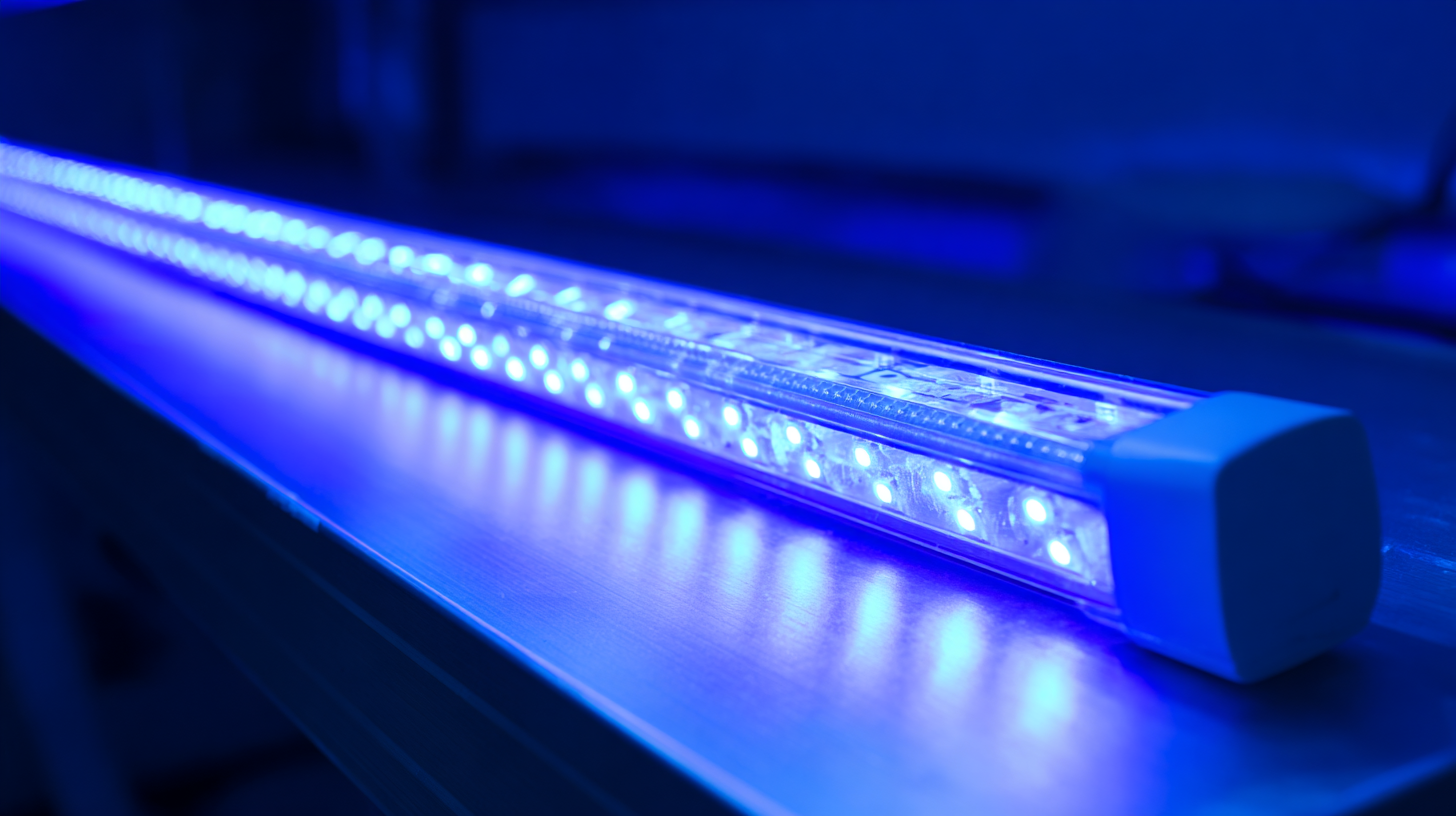What are the Advantages of Solar LED Technology for Sustainable Living
The integration of solar LED technology into sustainable living practices offers numerous benefits that align with the urgent need for environmentally friendly solutions. According to a report from the International Renewable Energy Agency (IRENA), the global solar energy capacity reached over 700 GW in 2020, showcasing a significant growth trajectory. Solar LED systems harness this abundant energy source, drastically reducing reliance on fossil fuels while minimizing carbon emissions. In fact, a study by the U.S. Department of Energy highlights that adopting solar LED lighting can reduce energy consumption by up to 75% compared to traditional lighting solutions. This shift not only enhances energy efficiency but also contributes to substantial cost savings for consumers and communities alike. As cities increasingly prioritize sustainability and resilience against climate change, solar LED technology stands out as a pivotal element in shaping a greener future.

Benefits of Solar LED Technology for Eco-Friendly Solutions
Solar LED technology presents a transformative approach to lighting that is not only efficient but also environmentally friendly. One of the key benefits of solar LEDs is their ability to harness renewable energy, significantly reducing reliance on fossil fuels. According to a report by the International Renewable Energy Agency (IRENA), the adoption of solar energy could help reduce global carbon dioxide emissions by up to 70% by 2050. This highlights the crucial role that solar technology plays in combating climate change while promoting sustainable living.
Moreover, solar LED lights are designed for longevity and minimal maintenance. The U.S. Department of Energy estimates that LED lights can last up to 25 times longer than traditional incandescent bulbs, resulting in lower energy consumption and decreased waste. When combined with solar power, these bulbs not only save on electricity costs but also avoid the ecological impact associated with frequent bulb replacements. As we shift toward eco-friendly solutions, integrating solar LED technology into our daily lives stands as a practical and impactful step towards achieving sustainable lifestyles.
Energy Efficiency: How Solar LEDs Reduce Power Consumption
Solar LED technology offers significant energy efficiency benefits that contribute to sustainable living. According to a report by the International Energy Agency (IEA), residential energy consumption can be reduced by up to 50% when switching from traditional lighting solutions to solar LED systems. This dramatic decrease in power consumption not only lowers electricity bills but also minimizes the carbon footprint associated with energy production.
Moreover, solar LEDs harness renewable energy from the sun, reducing reliance on fossil fuels. According to the U.S. Department of Energy, outdoor solar lighting can save an estimated 80% in energy costs compared to conventional alternatives. Systems equipped with solar panels can operate independently, meaning they do not draw power from the grid, further decreasing overall energy demand. This dual advantage of energy efficiency and renewable energy utilization makes solar LEDs a pivotal component in the shift towards sustainable living. By integrating solar LED technology into urban planning and residential areas, communities can significantly enhance their energy conservation efforts while promoting a cleaner environment.
Cost Savings: The Financial Advantages of Solar LED Lighting
 Solar LED technology has emerged as a significant contributor to cost savings, making it an attractive choice for sustainable living. One of the primary financial advantages of solar LED lighting is the reduction in electricity bills. Since solar-powered lights utilize energy from the sun, homeowners and businesses can drastically decrease or even eliminate their dependence on traditional power sources. This not only translates to lower monthly expenses but also contributes to long-term savings, as solar panels generally have a lifespan of 25 years or more.
Solar LED technology has emerged as a significant contributor to cost savings, making it an attractive choice for sustainable living. One of the primary financial advantages of solar LED lighting is the reduction in electricity bills. Since solar-powered lights utilize energy from the sun, homeowners and businesses can drastically decrease or even eliminate their dependence on traditional power sources. This not only translates to lower monthly expenses but also contributes to long-term savings, as solar panels generally have a lifespan of 25 years or more.
Moreover, the initial investment in solar LED lighting can often be offset by government incentives and rebates designed to encourage the adoption of renewable energy solutions. In many regions, municipalities provide financial support for residents and businesses that implement solar lighting systems. Additionally, the maintenance costs are significantly lower compared to conventional lighting. LED lights have a longer lifespan and are less prone to burnout, further enhancing their cost-effectiveness. Thus, investing in solar LED technology not only benefits the environment but also makes sound economic sense.
Durability and Longevity: Why Solar LEDs Outlast Traditional Lighting
Solar LED technology is revolutionizing outdoor lighting solutions, especially given its notable durability and longevity compared to traditional lighting. Unlike incandescent bulbs, which typically last around 1,000 hours, many solar LEDs can exceed 25,000 hours of usage. This significant difference highlights why solar LEDs are increasingly preferred for sustainable living. Their robust design often includes weather-resistant materials, making them ideal for outdoor applications where they are exposed to the elements.

When choosing solar outdoor lights, consider factors such as battery quality and solar panel efficiency. Higher-quality batteries can enhance the longevity of the lighting system, ensuring it operates effectively through various weather conditions. Additionally, solar LEDs generally require minimal maintenance, further solidifying their position as a smart, eco-friendly choice.
Tips: Always look for solar lights with a warranty of at least five years, as this often indicates their durability. Also, consider investing in lights with adjustable panels or multiple charging options to ensure optimal performance all year round.
Environmental Impact: Reducing Carbon Footprint with Solar LEDs
The adoption of Solar LED technology is increasingly recognized for its pivotal role in reducing environmental impact and lowering carbon footprints. According to the International Energy Agency, global energy-related CO2 emissions rose to a staggering 36.4 billion metric tons in 2021. Transitioning to solar-powered LED lighting can significantly mitigate this trend; solar LEDs can cut energy consumption by up to 90% compared to traditional lighting systems. This shift not only conserves energy but also reduces reliance on fossil fuels, which are the primary source of greenhouse gas emissions.
Implementing solar LEDs in residential areas and public spaces not only enhances energy efficiency but also promotes sustainable living. For example, a study by the U.S. Department of Energy indicates that the use of solar outdoor lighting can prevent the emission of over 1.5 metric tons of CO2 per installed unit annually. Tips for maximizing the benefits of solar LED technology include selecting high-quality products with energy-efficient ratings and opting for installations that maximize sun exposure throughout the day.
Furthermore, the durability of solar LEDs contributes to sustainability. Many products have a lifespan of over 25 years and require minimal maintenance. To further enhance effectiveness, consider incorporating smart technology, such as motion sensors, which can reduce energy usage during low-traffic periods. Embracing solar LED solutions not only fosters environmental responsibility but also leads to substantial long-term savings.
Conclusion
Solar LED technology presents significant advantages for sustainable living, providing eco-friendly solutions that contribute to a greener future. One of the main benefits is energy efficiency; solar LEDs reduce power consumption by harnessing solar energy, which translates into lower electricity bills for consumers. Additionally, the financial savings associated with solar LED lighting are considerable, as they typically have lower installation and maintenance costs compared to traditional lighting options.
Moreover, solar LEDs are known for their durability and longevity, often outlasting conventional lights, which reduces waste and the need for frequent replacements. Their environmental impact is profound, as they significantly contribute to reducing carbon footprints. The versatility of solar LED technology also allows for various applications in everyday life, from street lighting to garden illumination, making it an indispensable solution for sustainable practices. Overall, embracing solar LED technology is a step towards achieving a more sustainable and eco-conscious lifestyle.
Related Posts
-

5 Reasons Why Solar LED Lights Are the Smart Choice for Your Home
-

How to Choose the Best LED Street Light for Your Urban Environment
-

What are the Benefits of Using Grow Lights for Indoor Gardening
-

How to Choose the Best LED Outdoor Lighting for Your Garden
-

Exploring the Advantages of LED High Bay Lights for Optimal Industrial Lighting Solutions
-

Mastering the Art of Selecting the Perfect Commercial Lighting Fixtures: A Comprehensive Tutorial
